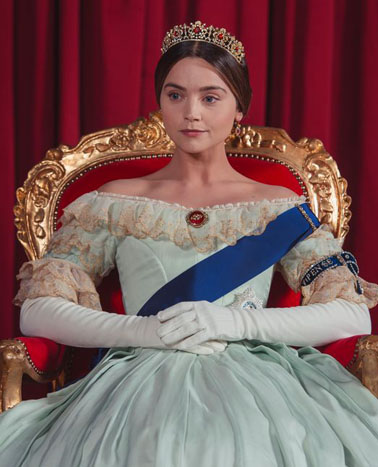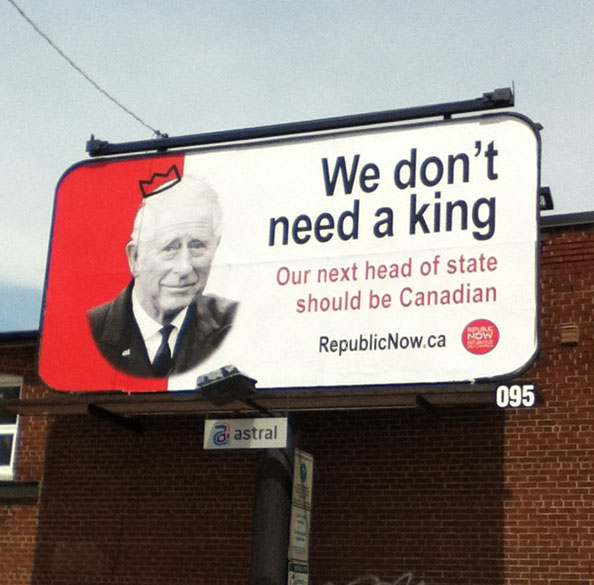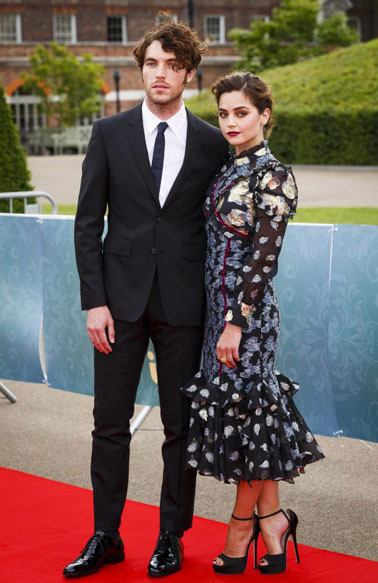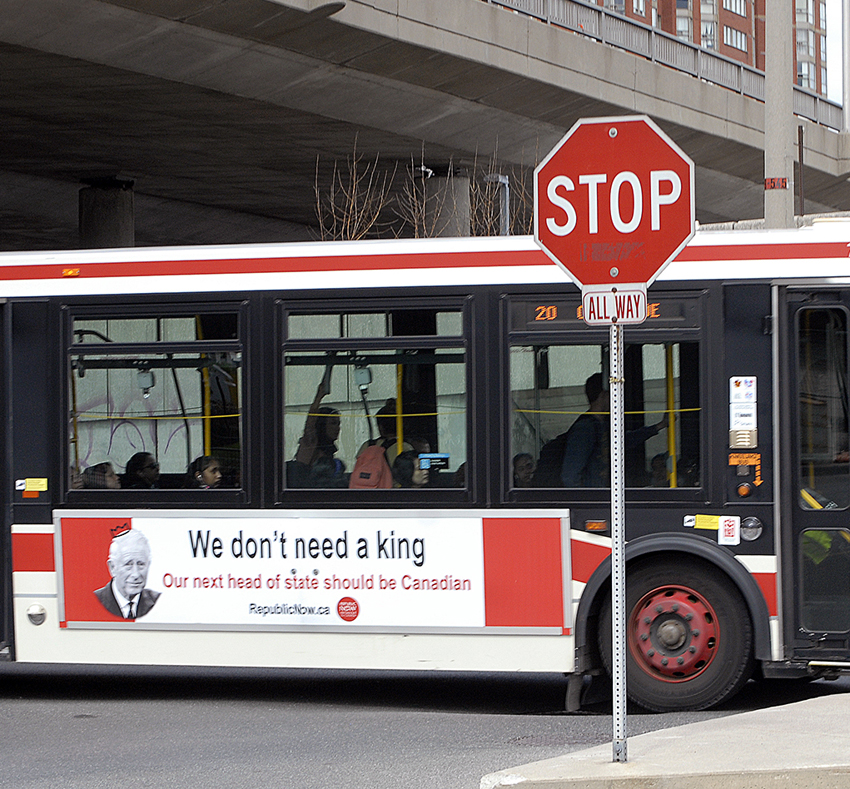On the “speculative play King Charles III” in Toronto .. and the future of the British monarchy in Canada
Feb 13th, 2018 | By Citizen X | Category: Canadian Republic

Jenna Coleman as Queen Victoria, who allegedly chose Ottawa – “the last lumber village before the North Pole” – as the capital of Canada.
As an altogether confirmed Canadian republican (not at all the same as an American Republican of course, especially today), I ordinarily do my best to ignore the British monarchy.
But two contemporary media events have slightly increased my interest in the subject. The first is Harry Windsor’s forthcoming marriage to the mixed-race (and unquestionably hot) Meghan Markle, from Black Beverly Hills in Los Angeles, CA.
The second is the current PBS/ITV Sunday night TV series, Victoria – in which the long-reigning Queen who theoretically presided over the creation of today’s Canadian confederation in 1867 is played by the (also unquestionably hot) “Blackpool beauty” Jenna Coleman.
(And I note that last night my TV-viewing partner and I finally watched Season 2, Episode 5, in which “feeling suffocated by the weight of the crown, Victoria escapes with her court to the Scottish Highlands.” Apparently based in no small part on “Queen Victoria’s actual diary entries from a 1844 royal visit to Scotland’s Blair Castle,” it is – whatever your political views – a brilliant piece of dramatic writing and performing.)
It was in some similar mood that I encountered a piece posted on the Toronto Star website this past Friday, headlined : “These actors are royals in the play King Charles III. Here’s what they think about the monarchy … The Star asked David Schurmann, a.k.a. Charles, and his cast mates why the royals fascinate us so and whether they support the monarchy.”
 The piece was indirectly helping to publicize David Mirvish’s (and Joel Greenberg’s) Toronto production of Michael Bartlett’s “speculative play King Charles III.”
The piece was indirectly helping to publicize David Mirvish’s (and Joel Greenberg’s) Toronto production of Michael Bartlett’s “speculative play King Charles III.”
(With Canadian resident actors – following “sold-out runs in London’s West End and on Broadway” in New York. The Toronto production opened this past Saturday, February 10.)
As an altogether confirmed Canadian republican I was especially struck by the British monarchy comments of David Schurmann (who plays the speculative King Charles in the Toronto production) and Wade Bogert-O’Brien (who plays an equally speculative Prince Harry).
Schurmann, in his earlier 70s, was born and raised in England but then moved to Canada, and now lives in the Toronto neighbourhood of Parkdale. He explained his view of the British monarchy today to Toronto Star Entertainment Reporter Bruce Demara :

Jenna Coleman in a real-life outfit that Queen Victoria would probably not be too amused by. Maybe ...?
“I think it works for the Brits definitely but I think for the rest of us, do we really need a monarch in Canada or Australia or the rest of the Commonwealth? I think the idea of the Commonwealth is very good. I support a monarchy for Britain, but I think the rest of us should say, ‘Bye, bye.’ I think everyone who supposedly has the Queen as their head of state, there should be a referendum everywhere and ask, ‘Do we actually want to maintain this?’”
Wade Bogert-O’Brien is much younger than David Schurmann – now in his early 30s, it seems. He spent much of his youth in Ottawa, and then went to theatre school at George Brown College in Toronto. His view of the monarchy is broadly similar to Schurmann’s, with a few nuances :
“When I really think about it, I am on principle opposed to a hereditary monarch being the head of state of a country. I just don’t think it’s justifiable for our head of state to be an inherited position, even if the title is essentially a symbolic one. So no, I guess I don’t support the continued existence of the monarchy. I don’t really know how you would get rid of it, and it probably won’t happen any time soon since people don’t really seem to care that much, but in my ideal world the monarchy would be gradually phased out through a series of modest reforms.”
* * * *

Blackpool beauty Jenna Coleman, who plays Queen Victoria in current compelling PBS (ITV) Sunday night TV series, is actually dating fellow actor Tom Hughes, who plays Queen Victoria’s husband Prince Albert, in real life. (As of this past December 31 in the UK Sun at least!)
The belief that “people don’t really seem to care that much” about the future of the British monarch as Canada’s continuing (albeit strictly symbolic) head of state strikes me as ultimately a polite fiction. It is put about by various elite and other minority groups who feel the monarchy works to their advantage in Canada, and don’t want to give the advantage up.
But I think it is true enough that the British monarchy in Canada today plays virtually no role of practical significance.
(What practical side there is to the monarch as head of state has been effectively vested in the governor general of Canada since George VI’s – and William Lyon Mackenzie King’s – “Letters Patent Constituting the Office of Governor General of Canada” in 1947. The online Canadian Encyclopedia offers an essentially British monarchist reading of this document, as maintained by the Harper Conservative government of 2006-2015. But it acknowledges that two recent Liberal-appointed governor generals [1999—2010] have taken a more Canadian democratic view of the office’s current powers, in practice and in theory.)
Because the actual British monarch plays virtually no practical role in Canada today, it is possible to believe that abolishing the monarchy would have no practical impact on ordinary Canadian life. And if this is true, it is logical enough that “people don’t really seem to care that much” about the future of the British monarch as Canada’s continuing symbolic head of state.
 But I don’t think this is altogether true myself, for several reasons I won’t go into here. (Briefly, I think abolishing even the mere symbolism of the British monarchy in Canada will have a broad democratizing and energizing effect on Canadian life, with entirely benign consequences.)
But I don’t think this is altogether true myself, for several reasons I won’t go into here. (Briefly, I think abolishing even the mere symbolism of the British monarchy in Canada will have a broad democratizing and energizing effect on Canadian life, with entirely benign consequences.)
As monarchists often urge, the ultimate practical point is that in the end abolishing the British monarchy in Canada is a constitutional issue. And it will require a difficult amendment to what is now called the Constitution Act, 1867 (formerly the British North America Act 1867).
This is just one of several unfinished articles of difficult constitutional business on the Canadian horizon – on a list that includes Indigenous rights, Quebec in the confederation, and Senate reform, as well as a democratic head of state. To believe in the real future of Canada is to believe that we the people of Canada finally will address these issues as we should, for our own survival and prosperity in an increasingly challenging global village.
Stephen Harper set this challenge aside, in an effort to boost archaic and now ineffective colonial-era institutions that still benefit at least some strategic groups of Conservative voters.
Justin Trudeau (while being very careful just what he says and does about the monarchy, and in my view largely failing on Senate reform, so far) has begun to take a few steps in some right direction, with his approach to Indigenous issues (and, eg, his recent remarks on Black history in Canada).
We Canadian republicans finally believe that history is on our side, and that our cause will win in the end, because it really is what makes the most sense in the increasingly (and even astonishingly) culturally diverse Canada of today.
There is also the question of what may or may not happen when a real King Charles III is about to ascend the throne in the green and pleasant land across the seas – a landmark raised by the Australian prime minister (and republican supporter in the Australian referendum of 1999), Malcolm Turnbull. And I think this just might have a bigger impact in Canada than anyone is imagining right now.
Or, as the now 95-year-old songstress from Cincinnati, Ohio, Doris Mary Ann Kappelhoff, explained in the middle of the 1950s, Que Sera, Sera (aka che sarà sarà ; Che sera, sera ; Che sarà sarà ; Whatever will be will be) … and a parliamentary democratic Canadian republic at last is in the DNA of the 1867 confederation … Protégera nos foyers et nos droits.


